|
|
|
Sort Order |
|
|
|
Items / Page
|
|
|
|
|
|
|
| Srl | Item |
| 1 |
ID:
084668


|
|
|
|
|
| Publication |
2008.
|
| Summary/Abstract |
There is an American foreign policy tradition in respect to military interventions in the Third World, which validates the importance of democratic ideals as central to the success of the policy. Woodrow Wilson is the founding father of this tradition. While the normative commitments of Wilson made sense in Victorian America and can probably be considered innovative for his day, the manifest lack of success in transferring democracy through military intervention leads us to question the character of Wilson's interventions and the ideals that motivated them. This essay will consider the content of Wilson's democratic theory and its integration into ideals of national mission and destiny; how this became the philosophical basis for policies of military intervention; the assessments offered by historians of the success of this policy; and the role of racial paternalism in legitimating the policy at the time. In a contemporary respect, we are left with the question of whether we want such a philosophy of democratic interventionism to be the basis for transferring democratic values and practices to Third World countries today.
|
|
|
|
|
|
|
|
|
|
|
|
|
|
|
|
| 2 |
ID:
084672


|
|
|
|
|
| Publication |
2008.
|
| Summary/Abstract |
Recent events have led to a renewed scholarly interest in empire and the question whether the United States and its policies abroad constitute an "American Empire." This essay clarifies the various uses of the term and argues that conceptual overstretching retards scholarly analysis of the phenomenon. This essay suggests a definition of the term "empire" and provides an ideal-typical reference point to study its empirical variations. I provide a typology of empires to guide the analysis of common features as well as distinguishing characteristics. We can then answer the question whether contemporary manifestations might differ from their historical precursors. American unilateralist policy today differs in fundamental respects from previous imperial processes and structures. In contradistinction with earlier empires, U.S. policies lack the incentive structures for peripheral elites and local populations that typified imperial rule in the past. While falling short of constituting a formal empire, its policies face the same contradictions that confronted the western maritime empires as well as the USSR and which led to their dismemberment.
|
|
|
|
|
|
|
|
|
|
|
|
|
|
|
|
| 3 |
ID:
084670
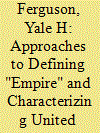

|
|
|
|
|
| Publication |
2008.
|
| Summary/Abstract |
The militant unilateralism of the George W. Bush administration has revived interest in such closely related and contested terms as "superpower,""hegemon,""empire," and "imperialism." This article identifies four different but somewhat overlapping approaches to defining "empire": ideal type, self-consciously empirical, constructivist, and overtly normative. The author's personal view is that any notion of American Empire or indeed U.S. hegemony or even superpower is profoundly misleading. Although the United States still ranks high on the scale of most traditional realist power factors, United States capabilities appear to be gravely waning today and its exercise of both hard and soft power has recently been so inept as to limit its current influence and possibly future role in global politics.
|
|
|
|
|
|
|
|
|
|
|
|
|
|
|
|
| 4 |
ID:
084677
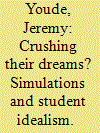

|
|
|
|
|
| Publication |
2008.
|
| Summary/Abstract |
In-class simulations can offer students an excellent opportunity to apply the lessons they have learned in a practical and fun manner. The literature on active learning in international relations demonstrates the many values simulations possess. In running a simulation on the conflict in Darfur, I identified an additional potential value in in-class simulations: they can be a technique for tempering student idealism. Students often fail to appreciate the disconnect between their personal political convictions and the political realities that impede conflict resolution. Simulations allow students to apply theory to practice in a way that encourages students to temper their idealism by acknowledging political realities on the ground. I discuss how a week-long simulation on Darfur encouraged students to balance idealism and realism and understand why reaching agreements in the international community can be so difficult.
|
|
|
|
|
|
|
|
|
|
|
|
|
|
|
|
| 5 |
ID:
084675
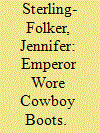

|
|
|
|
|
| Publication |
2008.
|
| Summary/Abstract |
Why does it matter if the United States is an empire in any objectively definable sense? All this academic and political pundit hand-wringing, over whether the United States should technically be labeled an empire or not, seems oddly out of step with the sorts of egregious foreign policy behaviors the United States engages in on a daily basis. Yet the words we use to describe something do matter a great deal to what we see and how we act in the world. In this paper, I argue that the closer one looks at the debate over the empire designation, the more one begins to see an underlying dynamic of political self-delusion that is endemic to the American power project. America wields enormous power that affects the daily lives of people around the globe, but like a schoolchild on the playground it does not like to be called names. The extent to which political observers participate in this obfuscation is an interesting topic in its own right, as it underscores how name-calling is a political act in itself.
|
|
|
|
|
|
|
|
|
|
|
|
|
|
|
|
| 6 |
ID:
084674


|
|
|
|
|
| Publication |
2008.
|
| Summary/Abstract |
I argue that American global power should not be considered as a case of empire, at least not in the way that we have come to define empires, historically. Rather, because it is consistent with and embedded in a postcolonial organization of political space that rests on upholding the legal-constitutional and political autonomy of states and promoting new sources of capitalist accumulation, the organization and realization of American global power is significantly different from other imperial experiences. The denial of empire, however, does not mean that the United States is not imperial or imperialist. The way in which American global power is organized and the socioeconomic and political relations that flow from it have reproduced enduring patterns of hierarchy, domination and exploitation, all of which highlight the enduring patterns of military power and geopolitical hierarchy.
|
|
|
|
|
|
|
|
|
|
|
|
|
|
|
|
| 7 |
ID:
084671


|
|
|
|
|
| Publication |
2008.
|
| Summary/Abstract |
The phrase "American empire" has reentered the popular lexicon but remains contested. What does it mean to say that the United States is an empire? Why has this term resurfaced after so many decades to describe the United States in the new millennium? What does this mean for American foreign policy? I attempt to answer these questions by making three interrelated points. First, empire is a particular authority relationship between two polities constituted by extreme forms of both security and economic hierarchy. Second, the United States today is not an empire but it does exert substantial authority over other states in a range of hierarchical relationships. Third, although not an empire, the United States is acting in an imperialist fashion and, paradoxically, is undermining the international authority that it has cultivated and nurtured over the last century.
|
|
|
|
|
|
|
|
|
|
|
|
|
|
|
|
| 8 |
ID:
084676
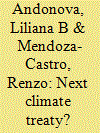

|
|
|
|
|
| Publication |
2008.
|
| Summary/Abstract |
Scholars and policy pundits have advanced more than thirteen different designs of a climate change treaty to succeed the Kyoto Protocol. Each of these designs claims to correct the defects of the current agreement. But what kind of a treaty is likely to pass the test of international and domestic politics and negotiations? Can we learn something about the hurdles and opportunities for climate cooperation from negotiations simulations in the classroom? The paper engages these questions by analyzing an experimental course design organized around simulated negotiations of the next climate change treaty. Unlike classroom simulations which rely on hypothetical scenarios, this course sought to approximate actual domestic and international constraints within which countries negotiate. The paper details the structure of the course, the ways in which it familiarizes students with domestic and international climate politics, and the components of the negotiations module. The analysis examines the pedagogical impact and policy learning associated with the simulation and draws conclusions about the broader applicability of this approach.
|
|
|
|
|
|
|
|
|
|
|
|
|
|
|
|
| 9 |
ID:
084669
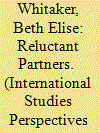

|
|
|
|
|
| Publication |
2008.
|
| Summary/Abstract |
Do fighting terrorism and promoting democracy go together, as policy makers suggest, or do they conflict in practice? This paper explores these dynamics in the case of Kenya, a transitional democracy that has been the victim of several terrorist attacks. Based on an examination of recent areas of cooperation and contention between the United States and Kenya, the paper argues that democratic pressures can make it difficult for newly elected governments to cooperate publicly in the "war on terror," though private cooperation often continues behind the scenes. This suggests the need for an approach among American policy makers that recognizes the domestic political constraints faced by foreign partners and seeks common ground between internal and external priorities. While the goals of promoting democracy and fighting terrorism may conflict in the short term, the development of shared democratic values could pave the way for closer partnerships in the future.
|
|
|
|
|
|
|
|
|
|
|
|
|
|
|
|
| 10 |
ID:
084673
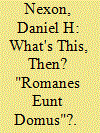

|
|
|
|
|
| Publication |
2008.
|
| Summary/Abstract |
This article cautions against a number of errors endemic to recent attempts to derive "lessons of empire" for United States foreign policy and grand strategy: (1) justifying the comparison between the United States and past imperial polities based on shared characteristics unrelated to the analytic category of empire, (2) failing to offer recommendations specific to imperial dynamics, (3) assuming that "empire" serves as an "analytic box" composed of otherwise indistinguishable entities, and (4) assessing the question of American Empire in categorical, rather than relational, terms. I next offer an ideal-typical account of the structure and dynamics of empires and discuss how such attention to patterns of domination and resistance-which I term the "micropolitics of hierarchy"-might provide better analytic leverage over key contemporary challenges than the traditional states-under-anarchy framework.
|
|
|
|
|
|
|
|
|
|
|
|
|
|
|
|
|
|
|
|
|